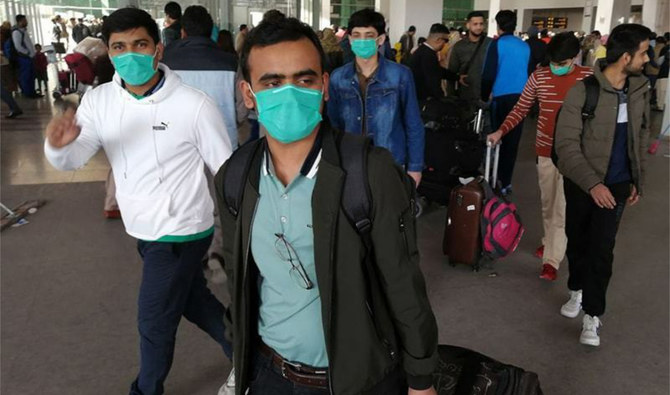ISLAMABAD: More than a year into the coronavirus pandemic, Pakistani students say they fear losing their qualifications from Chinese universities as thousands remain stranded at home, unable to return to classes despite the government’s assurance of constant negotiations with Beijing.
About 28,000 Pakistani students are enrolled in Chinese educational institutions and most of them have been stuck in Pakistan since China suspended the entry of foreign nationals in late March 2020 to stop the spread of COVID-19.
For more than a year, the Pakistani government has been saying it remains in touch with Chinese authorities to help students return to their colleges and universities, but some of them are on the verge of losing hope.
“We are hopeless and fearful that our money, time, is wasted, and our future is at stake,” Aroosa Khan, a Karachi-based student who has completed two years of medicine in China, told Arab News on Saturday.
“We are around 7,000 medical students in China, out of which above 85 percent are now stuck in Pakistan due to the travel ban,” she said, expressing the concern that they would not be able to become good doctors if they could not practice at university hospitals and clinical labs.
As Pakistan does not recognize medical degrees obtained from online courses — provided by Chinese institutes to overseas students due to the travel ban — Khan is worried that years of study and thousands of dollars spent on education may be in vain.
“It is not our fault that we have been compelled to take virtual classes. The majority of these medical students are on self-financing where their families have spent around Rs5 million ($28,000),” she said. “They are under acute stress and have become patients of depression due to the uncertainty hovering over their future.”
The worries of medical students are shared by those enrolled in engineering courses.
Adam Ali, from Attock, who is pursuing a degree in artificial intelligence at a Chinese university, said that he had exhausted all avenues of help.
“We have met everyone in the Foreign Office, the foreign minister, the education minister and all other officials, but nothing happened despite tall claims. When we wrote to the Pakistani Embassy in China, they didn’t even respond to our emails,” he told Arab News.
“When this travel ban was imposed and we started online classes, at that time we were assured by our Foreign Office that we would be able to travel back to China through chartered flights for next semester by the end of July 2020. But nothing happened.”
Another engineering student, Jamal Nasir, from Sialkot, said that he had left his job to pursue a master’s degree on a Chinese university scholarship, but as online classes were introduced that facility was discontinued.
“I had a good job but left it to pursue my master’s on a scholarship, which included a monthly stipend. After resumption of online classes, they have stopped (the) stipend as well, which created a lot of financial issues,” he said. “Now neither I have a job nor (am I) completing my studies due to the travel ban.”
As students from some other countries, including South Korea, were allowed back to Chinese campuses in August 2020 as part of intergovernmental deals, Nasir asked why it was not possible for Pakistanis to follow suit.
“If they want, they can impose quarantine and other standard restrictions but at least allow professional degree students to take physical classes,” he said.
The Pakistani government says that it is trying to resolve the issue.
“The issue has been discussed at various levels with the Chinese authorities both in Beijing and Islamabad,” foreign office spokesperson Asim Iftikhar told Arab News.
“We are also exploring the possibility of addressing the issues of research, lab work, scholarship etc with the relevant Pakistani and Chinese authorities and institutions,” he said. “We are pursuing the matter and are continuously in touch with the Chinese side at all levels.”
The Chinese Embassy in Islamabad told Arab News it had “nothing to comment on the matter at this time.”




























